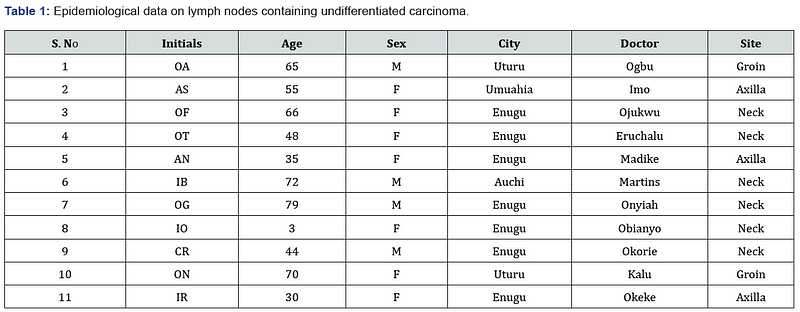Undifferentiated Carcinoma of Lymph Nodes- Juniper Publishers
Juniper Publishers- Journal of Cell Science
Abstract
The undifferentiated carcinomas seem to be a problem in terms of the lymph nodes. They were sought in the histological data pool established for the Ibo ethnic group in Nigeria. They were found mostly in females and in the neck. In general, attention is drawn to publications in which “or” appears to be the saving grace when the titles were chosen.
Keywords: Lymph node; Undifferentiated carcinoma; Age; Site; Sex; Definition problem
Introduction
A survey of the literature on lymph nodes concerning undifferentiated carcinoma is revealing, although some countries stand out. In alphabetical order, they are Costa Rica [1], Germany [2], Hong Kong [3], Japan [4], Korea [5], and Portugal [6]. Therefore, the Nigerian cases are deemed to be worthy of documentation from among the Ibo ethnic group [7]. In fact, this was facilitated by following the example of Birmingham (UK) authors who hypothesized that the establishment of a histopathology data pool facilitates epidemiological analysis [8].
Investigation
From 1970, the Government of the Eastern Region of Nigeria resuscitated the Pathology Department which was almost destroyed during the Civil War. As the pioneer pathologist, I insisted on receiving biopsy specimens provided that the epidemiological data were written up. Moreover, as I kept personal copies of the Reports, their analysis in tabular form was facilitated.
Results
(Table 1)

Discussion
Most of the specimens were received from hospitals based in Enugu. However, two Mission Hospitals situated in Uturu and Umuahia were fruitful. Moreover, the 6th concerned a distant town situated in another State far away. This is in consonance with my view that a central laboratory is useful to distant doctors [9,10]. Thus, this opinion opposes the once hotly debated issue in the UK concerning whether such distant laboratories could ever be useful [11]. Curiously, some authors were forced to entitle their works with “or” such as in “epidermoid or undifferentiated carcinoma in cervical lymph nodes” [12], and as in “patients presenting with metastatic adenocarcinoma or undifferentiated carcinoma” [13].
In Germany [2], the authors were satisfied that 16 of 18 cases of major salivary gland cancer showed undifferentiated carcinoma. From Hong Kong [3], there was access through fine needle aspiration cytology of lymph node. Concerning the esophagus [4], the Japanese 67-year-old man had “complete response to chemotherapy.”
Conclusion
The comparative cases from Korea [5] were explanatory. Thus, the disparate figures in that country were clearly those of the adenocarcinoma (57%) and of the undifferentiated carcinoma (9%). In this context, the latter seems to be relatively uncommon in epidemiological analysis. As to the future, authors are advised to be decisive instead of the indecisive “or” creeping up.
For more Open access journals
please visit our site: Juniper Publishers
For more articles please click
on Journal of Cell Science & Molecular
Biology




Comments
Post a Comment